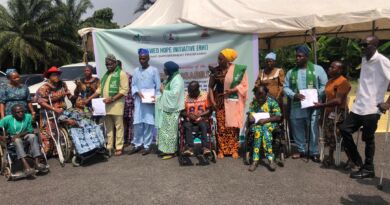Oyo Govt’s Integration Of Informal To Formal Sector Advances As Traders’ Data Capturing Begins In 33 LGAs
Oyo state Commissioner for Trade, Investment and Cooperatives, Otunba Ademola Ojo, has disclosed that plans by to properly integrate the informal with the formal sector in the state has reached advanced stage.
The Commissioner disclosed this during a media chat with newsmen in his office at the Ministry, Agodi Secretariat, Ibadan, on Thursday, February 1.
Otunba Ojo stated that the move by the Governor Seyi Makinde led government to integrate traders and artisans outside the taxable net into the formal sector in the state was largely to help businesses grow in line with the Omituntun 2.0 Sustainable Development Agenda.
He stated that there would be points of registration stationed across each of the 33 Local Government areas of the state and traders are enjoined to turn out to be captured as good and responsive citizens adding that any trader or artisan who failed to be captured would be denying themselves of all the packages government has planned out.
He disclosed that some telecommunication companies operating in Oyo state have keyed into Governor Makinde’s vision and have agreed a special package for all duly registered trader and artisan in the state to enjoy ₦500 (five hundred naira only) for a whole month after completion of registration.
“The government of Governor Seyi Makinde has shown the highest level of empathy to our people by not being tough on them with government policies affecting traders and artisans. These people are classified as operating in the informal sector because formal sector business operators are already registered with the concerned government authorities and we can easily access their information directly.
“But if you went to Gbagi market for instance, you have about three to four thousand traders doing businesses carelessly with no records with government, this is unacceptable, it is not good for us as government. Let me re-emphasize that this registration of traders is entirely for the benefit of our people.
” That is why we have segmented our plan into phases, the first phase is to get data of all the traders we have in Oyo state. For instance, governor Makinde is planning to support traders with loans, who are the people we’re going to give the money? If we did not have traders data required, such loans may end up in the wrong hands but once we have our data, then if we took say 300 or 400 people for first loan disbursement, then you know next time, you have to continue from the last number you stopped from, and that’s how it continues till the last person is reached.”
“In Oyo state, there’s what we call Market Leaders Council, this council has been broken into 12 clusters across the state. And these clusters have been urged to ensure that anyone who calls him or herself as a trader must duly identify with any of the clusters so that these clusters are the people we deal with when we’re set to roll out anything at the government level, and what we have discovered is that the records of these clusters are inadequate and we have to update those records, but we already have the basis to begin with since the clusters are already in existence.
“By the time we’re done, we would be able to properly group traders based on what product(s) they sell, all of these are going to be revealed from the data we’re gathering. Government is trying to help them, and there’s no way they would not be expected to reciprocate government’s laudable gesture.
Otunba Ojo, who reassured that the ongoing data capturing was not motivated by the desire to generate revenue for government alone stressed that what duly registered traders stand to gain far outweighs the token they’re expected to pay as tax maintaining that no trader or artisan would be left behind including those in the city and rural areas.
While calling for maximum cooperation from traders and artisans in the state to support government in the ongoing registration and data capturing, the Commissioner maintained that it was imperative and mandatory for all traders and artisans in the state to comply to avoid being sanctioned as government would not condone any contrary move from any quarter to sabotage or frustrate its efforts towards achieving its sustainable development agenda.
Otunba Ojo, who noted that there is already an existing executive order by Governor Makinde that makes it a criminal offense for tax evaders, equally stated that it is no longer business as usual in Oyo state. He added: “the most important thing we’re currently doing in this ministry which is capable of tremendously helping our people is data gathering of all traders and artisans in Oyo state. We are so determined in this efforts such that we intend to also capture roadside traders as well.
” What this means for us as government is tightening up lose ends in term of adequate security because some of those traders you see by the roadside are not genuine traders, some of them are informants to criminal and unscrupulous elements in our society, but if they are duly registered with the state government, we would be able to carefully reduce the risk of having such people around.
“As you would have noticed the presence of armed security operatives including Operation Burst and Amotekun, stationed at strategic locations around all our markets in both the city and rural areas, it cost government good money to do all these things and provide adequate security that we enjoy today in Oyo state so, we expect a reciprocity from the traders by fully cooperating with us so that we can both achieve a better and developed pacesetter’s state for us all. “




